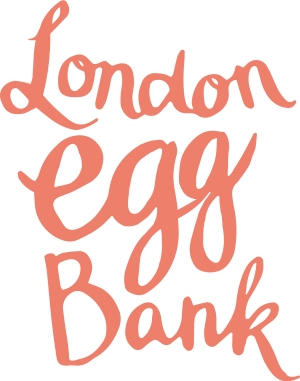
Navigating the many decisions involved in egg donation treatment can initially seem overwhelming. At London Egg Bank, we aim to provide all the support and information necessary for the best chance of a successful pregnancy.
Some of the questions we’re most often asked are about the advantages of egg donor IVF treatment in the UK or abroad. Here are five things to consider when considering the options of ‘cross-border’ egg donation treatment.
Are there enough available and suitable eggs in the UK?
London Egg Bank has no waiting list for egg donors, with a large and growing choice of UK-recruited donors from very different backgrounds. With a rigorous screening process in place for all our donors, they all meet the Human Fertilisation and Embryology Authority (HFEA) standards.
We hold the largest selection of frozen donor eggs in the UK, with over 20,000 in deep-freeze storage, and you have access to browse our donor database with online and personalised search options available.
Most ethnicities are available without a waiting list, and new donors with detailed profiles on ethnicity, age, physical type and interests are uploaded every week, so a suitable match should be available without unnecessary delay.
Will the donor be anonymous?
From 2005 any donor-conceived child in the UK has the legal right to access identifying information about their donor, via the Human Fertilisation and Embryology Authority (HFEA), at the age of 18.
At London Egg Bank we support informed decision-making in the discussion of the long-term implications for the whole family, openness about donor conception and parental confidence in choices made.
Treatments outside the UK are unlikely to be governed by the same rigorous regulatory framework that exists in the UK. Access to information about a donor may not be available to your child in the future dependent on which country the treatment takes place in.
You should know that you aren’t alone in making these decisions, and that advice and guidance is available from organisations and other families who have been in your position. The Donor Conception Network is a good starting point for further information.
How regulated is the egg donation process in the UK and other countries?
There is a high level of transparency and accountability in the UK, which is very clearly laid out for ease of understanding by the HFEA.
Using a UK licensed clinic means the donor has no rights or responsibilities to any children conceived, and donors are given counselling to fully understand the commitment they’re making. There is a ten-family limit in the UK, which means that no more than ten families can benefit from using the same donor.
The HFEA holds the longest-running register of fertility treatment data in the world – and all clinics in the UK must report all fertility treatments and registered donors, which allows tracking the number of children born for each donor. In contrast, many countries don’t have national databases with regulatory requirements.
We are also keen to treat our donors well, providing emotional counselling as well as practical support, to make donating eggs a positive process for them.
Availability of treatment can vary from country to country, with some family combinations such as same-sex couples or single women unable to access treatment due to local legislation.
“We are also keen to treat our donors well, providing emotional counselling as well as practical support, to make donating eggs a positive process for them.”
– Marta Wolska, London Egg Bank Manager
Is it safe to have donor egg treatment outside the UK?
Many people do have safe and successful treatment overseas, but there are significant differences in the treatments, so it’s important to do your own thorough research.
The biggest risk to health for mothers and babies is multiple pregnancies, where twins or triplets are expected. In the UK it’s best practice to transfer one embryo for most pregnancies, but this may not be the case in other countries. Consider an overseas clinic’s approach to embryo transfer and assess how this affects the success rate criteria that are presented.
Local healthcare and general conditions and standards will differ from country to country, so consider having specialist medical insurance in place in case of any problems or complications.
Is it cheaper to get donor egg treatment abroad?
We’re very transparent about the costs of all our treatment plans, and we aim to clearly set your expectations before starting treatment.
Headline prices from non-UK clinics may not show the full picture and may not include fertility drugs or essential procedures such as blood tests, all of which will add to the total cost of treatment. If multiple cycles are needed, these additional costs can make a significant difference.
For treatment abroad you’ll also need to consider the impact of making multiple short-notice trips to fit with treatment timing, adding in travel and accommodation costs. Factoring in time taken off work and appropriate levels of medical insurance will add to the bill. You should make sure to consider all these additional hidden IVF costs abroad to make sure you have a true comparison between treatments undertaken at home or abroad.
Success rates for overseas clinics promise an almost 90% chance of success?
In the UK, the HFEA and consumer protection regulations advise fertility clinics on what information should be displayed on their websites and how success rates should be reported. For example, if a clinic provides cumulative results for four treatment cycles (which may often be with multiple embryos transferred in each cycle, or with donor eggs for patients under 35) these results will be much higher than those from patients over 35 after a single treatment cycle. How success rates are calculated is the most important small print of any website.
Questions you should ask in your doctor’s consultation/ your clinic:
- What’s the overall success rate for treatment with donor eggs and for my age group specifically?
- What is the fresh and cumulative live birth rate per patient starting treatment?
- How do these live birth rates vary with age?
- How many oocyte donation treatment cycles were taken into account in your stats? (Results can be different if the clinic performed 100 cycles or only 3, the more cycles a clinic performs the more representative their stats are).
Egg donation can be a complex topic, best supported by extensive consultation and counselling for donors, recipients and partners. When considering this treatment, we recommend that you take time to understand the whole picture, to explore the experiences of other people who have been in your situation, and to look for support from available counselling.
At London Egg Bank we’re here to support you every step of the way, and when you’re ready to start, we’ll be ready for you.

